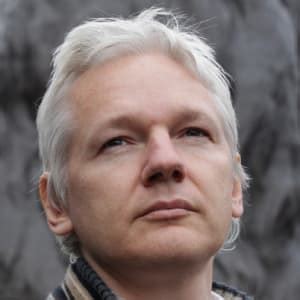
I can’t hide it, emotion gripped me when I returned to London after exactly 5 long months since the epic last day of Julian Assange’s trial at the Woolwich Court on February 27th. In the meantime, we have lived through many trials, the strange and violent Covid adventure, police confinement, social and economic chaos, the ultimate terror that many of our citizens still feel. Words are lacking to describe the strange feeling of a return to the « life before », when the political power is still the same and we are weakened by what it inflicts on us, in France as in England and throughout Europe.
Nevertheless, we are not giving up the struggle. The borders being open again, the quarantine over, I went back to Paris – London Victoria Coach Station. Eurolines having been swallowed up by its German competitor, the bus drivers were no longer the ones I had come to know by dint of making the trip twice a month. Were they fired in the context of the compulsory liquidation that Flixbus imposed on Eurolines? Some restrictions are still in place: one out of two seats condemned, toilets closed… The bus was occupied by migrant families joining theirs. My young neighbour was a Polish migrant living in London who took advantage of a cheap offer to make a tourist stop in Paris.
The border crossing lasted two hours because you had to show your white paw: a form filled in on the British government website in which you had to fill in your departure and arrival details, information on your means of transport and the sacrosanct mobile phone in order to be contacted again if you had transmitted a coronavirus to someone… You also had to leave a third person’s phone in case you refused to answer the friendly government requests on the covid19. But the border police seemed annoyed by this bureaucratic hassle and let me pass without presenting the document in view of my French passport.
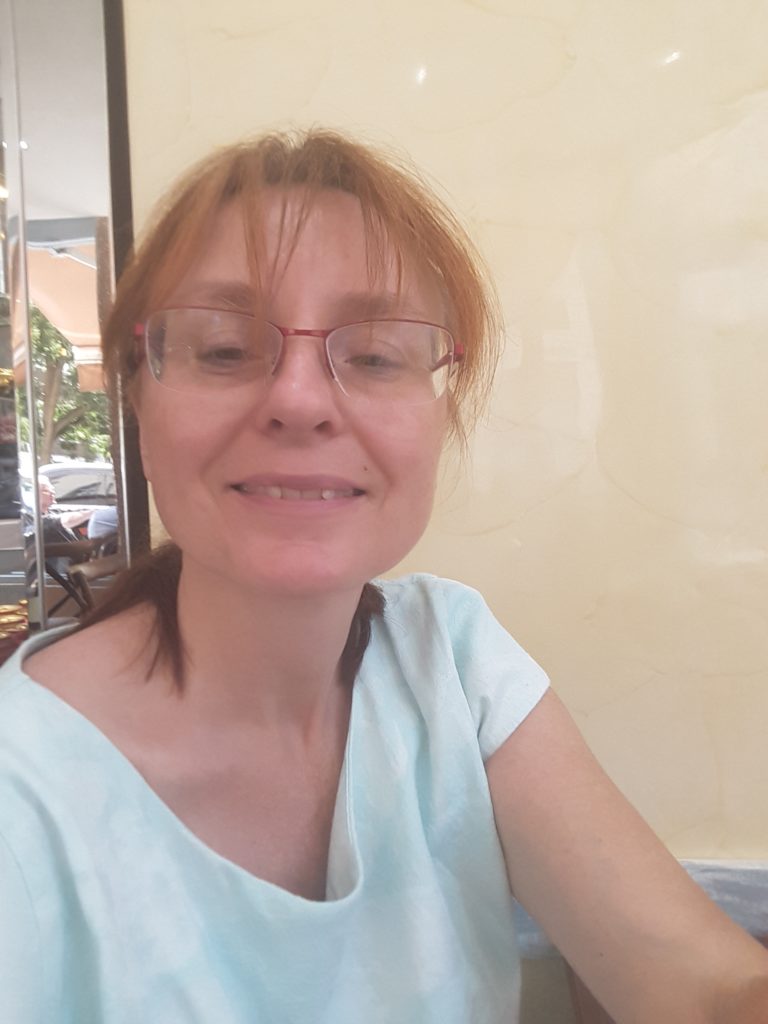
My reunion with the British capital was full of emotion. Indeed, contrary to what I had expected, I felt very comfortable. The great city of London is almost empty. People were walking slowly, without stress, the weather was superb (except this Monday…). The greenery and flowers were shining. People are apparently not terrorized by disease. Very few masks in the streets, and despite the obligation, very few masks in shops, cafes and restaurants. It is in the subway that the wearing of masks is the most disciplined, although the trains were empty of the usual crowds, although I don’t understand if this is due to holidays or teleworking. Admittedly, economic activity is reduced, and a large number of hotels and restaurants are closed, hoping to reopen in August. I do not know what is happening to the workers in these establishments. But I was happy to find my little habits in the cafés in the Paddington area around the Frontline Club, places that Julian Assange had frequented and which are only a few hundred metres from Westminster Court. Opposite the Frontline Club, Norfolk Place, lies the huge complex of St Mary’s Hospital, the historic site of Alexander Fleming’s discovery of penicillin. 50 metres from the Frontline Club is a place of powerful power, the importance of which we unfortunately did not grasp last winter: the Imperial College of London Medical School. This « Imperial » research centre which has influenced our lives in France and Europe to an unimaginable extent is physically part of the Saint Mary’s Hospital complex but is not dependent on the British health system, the National Health Administration. The all-too-famous Neil Fergusson, a 50-year-old mathematician who boasts of having imposed total confinement on the French population after terrorizing President Macron, is vice-decan, vice-president of this institution and sits in this building (1).
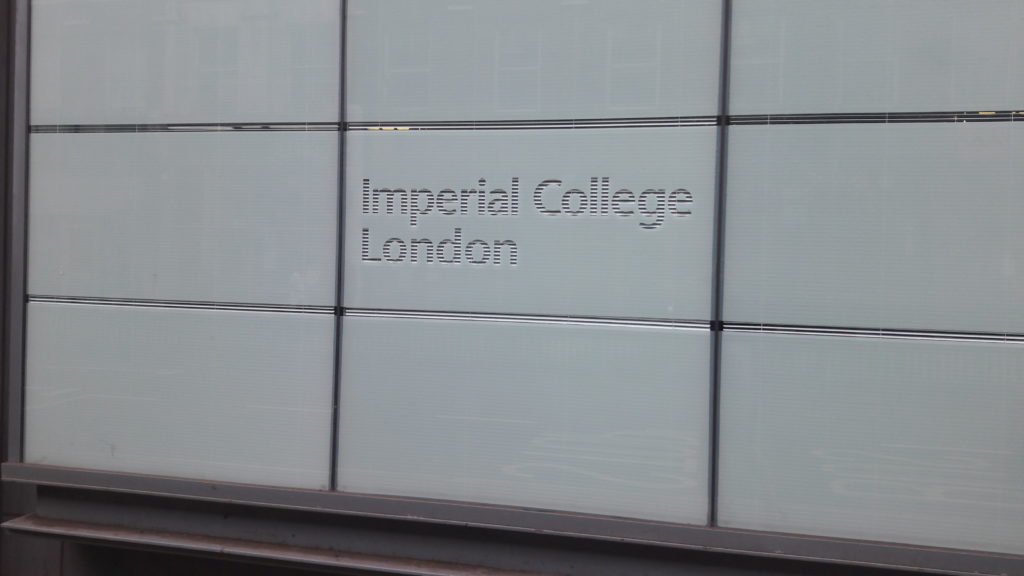
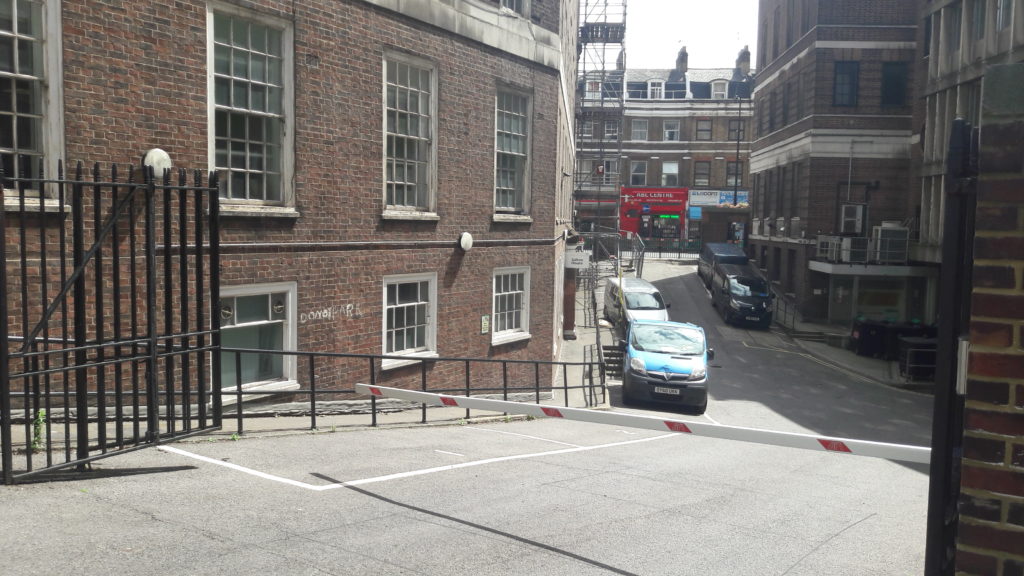
On Monday 27 July 2020, at 8 a.m., in front of the Westminster Court there was nobody there. So I was the first to enter the court. At 8.15 a.m. two activists from Don’t Extradite Assange arrived, followed by journalists Marty Silk, Mohamed El Maazi, Juan Passerelli and other regulars. We greeted each other and exchanged news in a friendly atmosphere, like a family prevented from seeing each other again because of the political closure of the borders. It must be said that in the absence of Greekemmy the atmosphere was always more relaxed in the courtyard. I spent the hour and a half waiting in front of the door to sympathize and chat with a German-speaking activist.
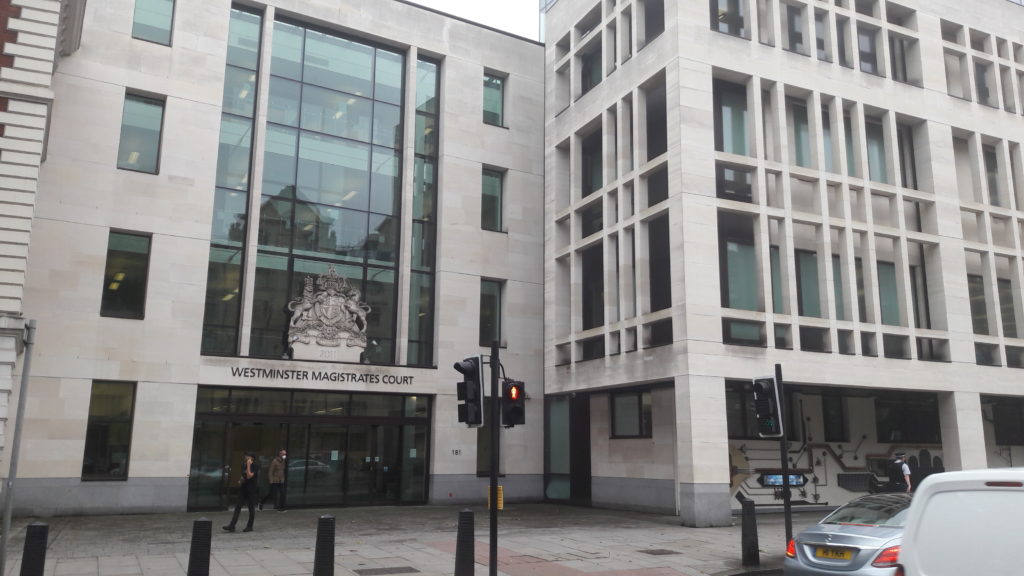
At 9:30 a.m., I met the same security guards from Mitie who have known us for almost a year already. I found the list of extradited persons in the hall – Julian Assange as number 1 for room 3, then 15 names of Poles, Romanians, Slovaks, Hungarians… When I found myself in front of the door of room 3, with a « social distancing » of 2 meters imposed between each person, (to be compared with the 1 meter in France), I noticed that apart from us, Julian Assange’s supporters, there was nobody else. The court was empty, as if it was disused. No secretary came to stick the list of the judges on the door. The secretariat looked like it was closed. A poster on the front door informed that the hearings would be held by video and that each defendant and his family would receive the necessary information by e-mail. The Covid crisis has amplified the British policy already underway to dematerialize all institutions. The buildings thus freed from the useless human presence will thus be able to be used for something else, the question is precisely what for?
So we spent 45 minutes alone in the vast waiting room in front of the empty coffee machines. A few Polish lawyers nevertheless appeared later for some exceptional physical hearings. The families of the Eastern Europeans on trial after Julian Assange remained absent. The « ghost court » aspect was accentuated when at 10 am we noticed that there was still no movement in the courtroom. In the meantime, lawyer Edward Hamilton Fitzgerald had arrived accompanied by a young blonde woman, perhaps his collaborator, whose name was published on twitter as Julian Assange’s new lawyer. It must be said that Gareth Peirce was no longer there. Edward Hamilton Fitzgerald and the young woman held a brief meeting in the first consultation room at about 10 o’clock. I also note the presence of Mark Summers. In the audience, two female journalists arrived as well as a curious young girl wearing a black cap and a black mask so big that one could never recognize her face. She was sitting on a chair reading a book called « Skripal files ». She did not enter the public gallery until 11:30 am.
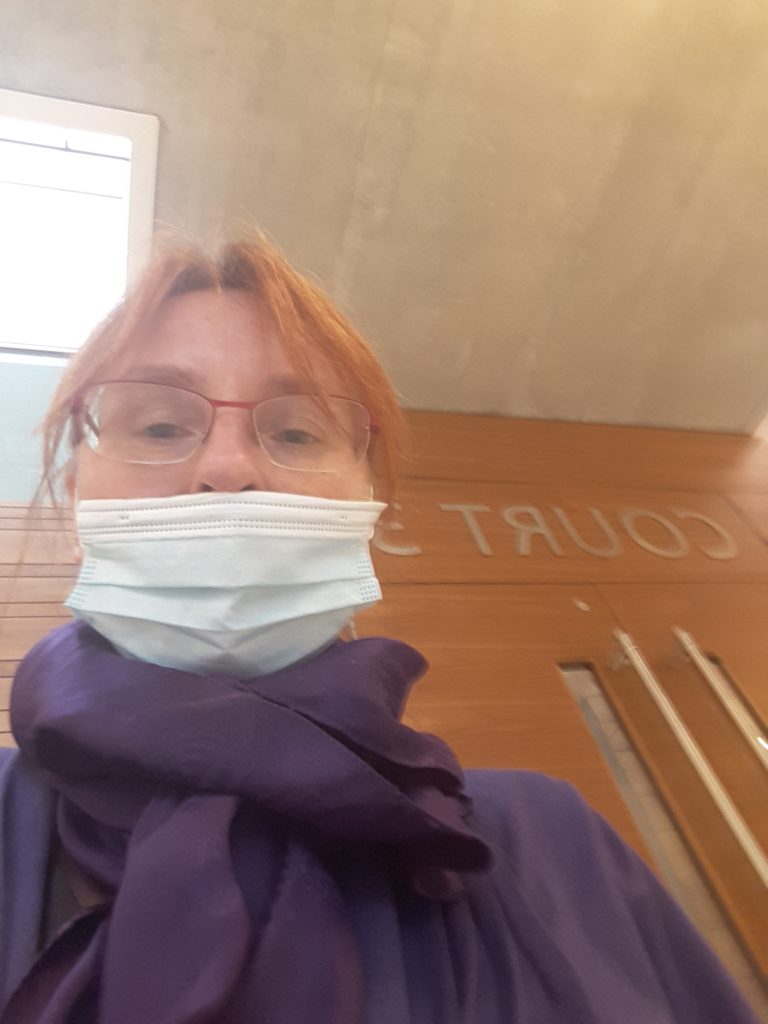
In theory the mask is compulsory for everyone, but only ordinary citizens are required to exercise. Vanessa Baraitser, the clerk, the court clerk, the prosecutor and the lawyers did not wear masks during the hearing or in the corridors. It is obvious that no one here believes in the need to protect oneself from « danger » and those present who know each other kiss and touch each other without any embarrassment. What a contrast with our countries of continental Europe, which have been kneaded for 5 months by a panic fear that is as irrational as it is ancestral!
It is already more than 10 o’clock when the hall opens and without any other form of ceremony, in the absence of any court officials, we settle in without any way, whereas in winter the control of the allocation of seats was so severe and the object of so much tension. Journalists are even moving into the right-wing ranks, normally reserved for the court employees who are now absent. The clerk is already sitting at his desk under the dais and he won’t raise his head from his computer as if everything that is happening here does not concern him. Fitzgerald is sitting next to a young prosecutor, the old one, Lewis, is not there. There is a playground atmosphere in the room, rather than a court of life and death, the freedom of people. Vanessa Baraitser arrives, equal to herself in her same black outfits and gives the same speech, not without having warned that she will not tolerate people standing in the public gallery: indeed, because of coronavirus, half of the seats are condemned, we can only be eight. As I entered first, I am comfortably seated in the middle of the front row.
In the surrounding hubbub, I don’t understand everything that is being said. Five months and a few tests later, I am no longer in the bath of legal English as I was in February. Moreover, the « online conference » – the parallel conference call – hinders comprehension because every time someone logs on or leaves the « conference » a loud, artificial voice resounds in the room. What is immediately apparent is that Julian Assange will not be appearing contrary to what was announced on twitter. I understand that lawyer Fitzgerald is justified in having contacted Belmarsh and that the prison would have told him that they were not aware of the prisoner’s appearance today! Judge Baraitser responds that she is not responsible and that the prisoner’s appearance is not her business ! I think we’re walking on our heads! If now it is up to the lawyers to call the prison to arrange the appearance of the accused, are we really still in a real court? But yes, Baraitser instructs the lawyer to call the prison himself!
She dialogues with the young prosecutor who seems to know nothing about it either and starts her administrative job of preparing the final trial asking the prosecution to provide written arguments by September and listening to the answers on what has already been e-mailed to her by the parties. Only once, out loud as if to address us, Baraitser notes Julian Assange’s absence. Fitzgerald is as usual hesitant with this attitude of permanent justification that characterizes him and which exasperates more than one activist. He ends up saying that he would like to consult with his client and would be very happy if he could establish this contact. At 10:30 a.m., Baraitser finally gets fed up with the cinema and says, « We were not able to see Mr. Assange. Make a request to the prison and when you are ready, let me know ». She leaves quietly, and while we stand up as usual, the journalists leave the room, while Mark Summers replaces Fitzgerald on the lawyers’ seat.
I’m annoyed. What is still going on in this « Kasperletheater », (puppet theatre according to the German sympathizer?). Should I go out like the others or should I stay and watch my place? Or are the real decisions made? Is it the lawyers who run the court or the court that establishes and monitors the procedures? What is this place that definitely does not look like a court?
Another young prosecutor begins a long tirade about organized bank fraud in Latvia at the beginning of the brilliant years of the wild capitalism of the 90s. I understand we’ve moved on to the next case and I’m staying to listen and learn. Mark Summers responds to the prosecutor and I understand the whole story for an hour and a quarter. A certain Mr. « Kopiczko » or « Pavliczko » (I never understand Eastern European names pronounced in English) is being prosecuted by Latvia for bank fraud. Having been an agent of the KGB, he was granted asylum in Russia, and in 1997 Russia rejected Latvia’s request for extradition. Summers pleads without hesitation for the rights of his client, a former KGB agent. In spite of his work for the Russian agency, the accused obtained the right of asylum in Great Britain in 1999 and Great Britain refused his extradition in 2002. Latvia joined the European Union in 2004 and demanded his extradition in 2007 via a European arrest warrant. However, since 2007, this warrant has not been executed. There is no reason to extradite in 2020 a man whose extradition was already refused by the British state in 2002, concludes the lawyer. I look in the direction of the box of the accused: Mr. « Bobiczko » or « Pavliczko » is sitting in front of the box, he is a small man in a dark suit and with an all-purpose appearance.
At 11.26 a.m. something suddenly happens, a rumour arises. The journalists return and the activists take their places. Some sit on the floor so that Baraitser cannot see them from his platform. The latter has run away without any way at the end of the pleading, she comes back quietly around 11:35 am. It is 11.28 a.m. and there is no more mention of Mr. « Bobiczko/Pavliczko ». Later, I go down to the hall to consult the list of defendants in room 3 to spell his name correctly. I note one Romanian, one Pole, one Lithuanian, one Hungarian, one Slovak and one Pole again. No Latvian or Russian on the list. That’s odd. An unscheduled case is being tried when the scheduled defendants are not. What’s going on here?
At 11:30, the clerk manipulates the video order. We understand that Julian’s going to appear in court. On the screen on the left, I see a dark box filmed up close with a door on the left and a window on the right. A small sign « HMP Belmarsh » hangs under the window. Curiously, a sort of bar crosses the screen, as if there were a table or counter in front of the seat. The minutes go by. At 11.45 a.m. the clerk declares « Good Morning Belmarsh ». Baraister then requests that Julian Assange be called. A blonde woman in black uniform appears on the screen in the doorway of the storeroom without it being known whether the suit she is wearing is really the dress of the guards of this prison. A minute goes by and we see a movement in the corridor behind the stall. Then Julian Assange comes in. You can’t see the whole thing because the camera cuts him off at the waist. So you can’t see if he’s walking normally or if he can barely stand. He immediately sits on the seat in front of the camera. The bar across the screen cuts him in the chest, so you can’t see his legs. He is wearing a beige sweater and a white shirt with the collar pulled out over the sweater. It is rather cool that day, but wearing a sweater in the middle of summer can only mean that he is subjected to the cold air of a severe climate. Behind him, the corridor is under artificial light. He has short hair with a fringe on the side, his face is hairless, he doesn’t wear glasses. Some activists told me about a white band on his forehead, I didn’t see it, but it’s possible that my vision at 10 meters away wasn’t good enough.
However, I can clearly see Julian Assange’s face. I recognize him. It is the same man as in February, his face looks the same as it did on February 27th. His face is rather round, less emaciated than in January. His eyes are a little bit blacked out, sunken in his sockets, and his face is sad. However, I have the impression that he is less emaciated than before. He puts his hands on his thighs and doesn’t move, looking down in a prostrate attitude.
When Vanessa Baraitser asks him to state his name, he says « Julian Assange » and his date of birth « 3 July 1971 » in a voice that seems more assured. Unless they had simply pushed the microphones to the limit: the events of February had shown us that the organizers of the show were capable of cutting off the microphones in the public gallery so that nothing could be heard of what he was saying or shouting – on February 26th and 27th he had stood up in protest and we had seen him revolt without being able to hear him… Everything is designed to leave him speechless and keep us helpless in the face of the « puppet show ».
Vanessa Baraitser begins a dialogue with the lawyer and the prosecutor about the new accusations that are being reported in the media. Hamilton Fitzgerald brings up the subject, hoping that the existing charges will be dropped in favour of the news. This is odd because in law, proceedings that have already been initiated must be completed and a new charge would normally be the subject of another proceeding. I am trying to see Julian’s hands, I am trying to convey to him all our collective thoughts of support and friendship. Behind him, silhouettes of women dressed in green or blue gowns pass by and pass over several times. It clearly feels like they are medical gowns and the wives of hospital staff. Finally, Julian Assange raises his eyes and looks straight ahead into the camera. I’m convinced he knows we’re here. At the end, he coughs and then raises his hands to his face three times. The emotion is there, he responded to our gesture.
At 12.03 on the dot, Vanessa Baraitser said she was negotiating with the Old Bailey court. Julian Assange leans slightly to her right. Fitzgerald brings up the subject of a psychiatric examination. I’m disappointed. A psychiatric report has no place in extradition proceedings. It is finally the prosecutor who seems less aggressive: for him the new charges have not been filed, are therefore not subject to debate and he is not in a hurry to deal with the psychiatric expertise. Finally, Vanessa Baraitser sets two new dates: August 14 for a « final admission hearing » and August 24 for the « call over hearing ». Julian Assange will have to appear on video. The discussion resumes on the weeks of procedures scheduled at the Old Bailey. I understand that the defense is asking for additional weeks but I do not understand what the final decision is. At 12:05, it’s over. Vanessa Baraitser gets up and leaves. That’s expedited.
We try to stay, we raise our fists when Julian Assange gets up and turns to walk out of the stall. He looks weary and I feel his weariness. How much time are we going to spend within these walls? I come out disturbed, despite my satisfaction at having once again made the trip and done my duty.
From the waiting room, I see the Poles and the Romanians and their lawyers moving towards room number one. Outside, the activists are being filmed by cameras. Edward Fitzgerald gives a quick report of the hearing to someone on the phone. I have doubts that he is really the decision-maker in this trial. I have doubts about what this building, this courtroom, is all about. Around him are strange buildings: the adjoining building is disused and under construction since 2011, theoretically managed by the company Proximity, but in one of its wings, 191 Old Marylbone Road, refugees are housed in a kind of shabby hotel under the pompous name of « Mina Palace » (2). The history of the building tells us that in this place was until 1948 the oldest maternity hospital in London where poor women came to give birth and sometimes, alas, to abandon their children (3). The nurses of the hospital were directly housed here. Today, children’s clothes hanging from the windows and toys in the small hall attest to an effective human presence. Opposite the court, on the avenue, an imposing red brick building belongs to the Church Army, a charitable church organisation working for the state (no separation of church and state in England). It houses the Women’s Day Center, a shelter for homeless women. 300 metres west of the courtyard (4), towards Edgware Road, a building dating from the 1960s houses refugees from the NGO One Westminster. The neighbourhood appears in its obvious social regres.
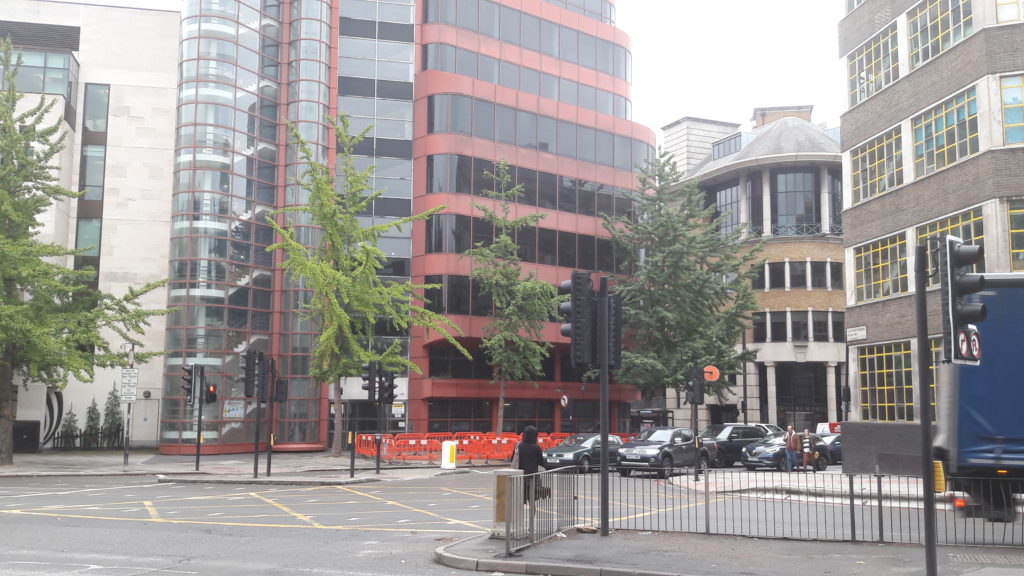
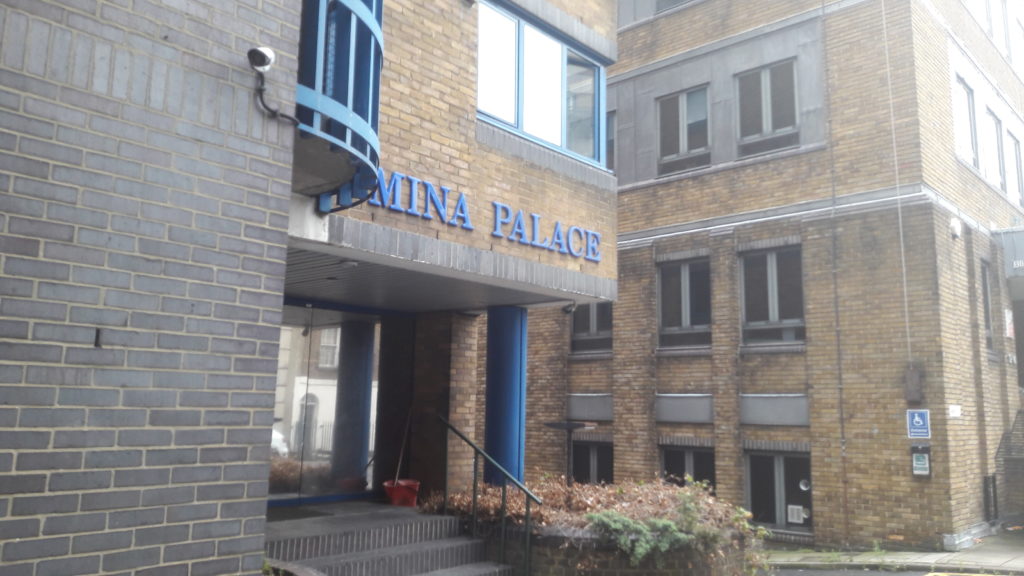
From the Marylbone subway station to Edgware Road station, this former working-class neighborhood is undergoing a profound transformation: entire blocks of houses are being destroyed and gaping holes are surrounded by large fences. Office buildings and residences made of concrete and glass are emerging from the ground. Powerful investors are transforming this neighbourhood in an intense gentrification process. The Westminster Court building, built in 2011 on the site of the « Old Marylbone police court », has the soulless style of so many offices in our neo-liberal metropolises. Its use as a court of law seems increasingly questionable to me.
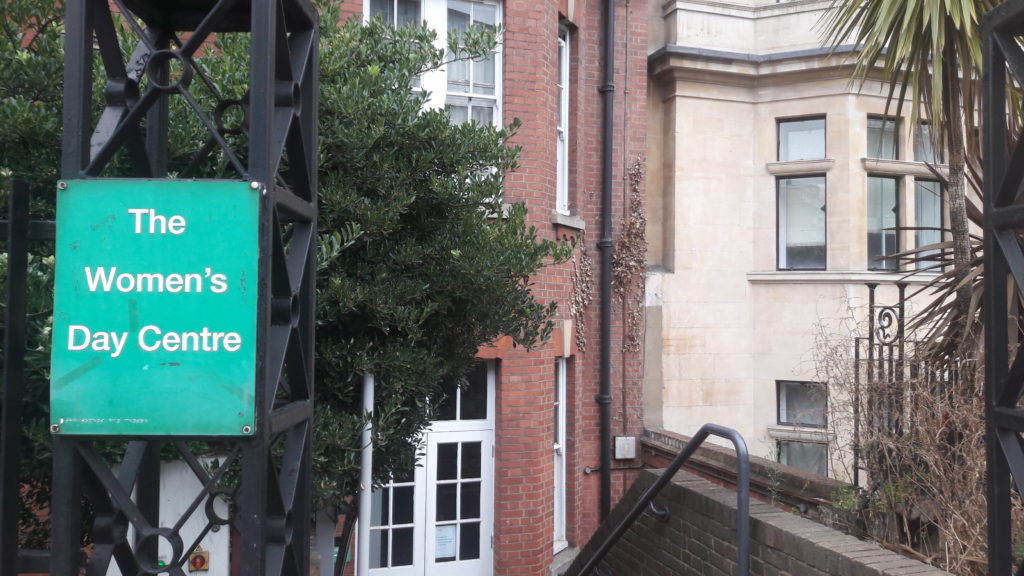
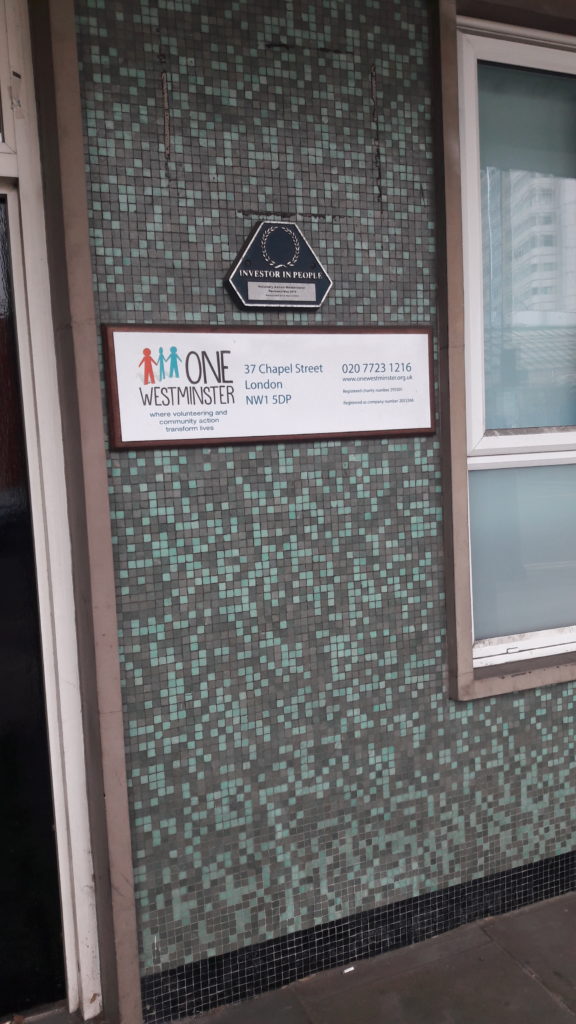
A few days later, on Wednesday evening at 9 p.m. on July 29th, the underground entrance to the courtyard through which the detainees are brought was illuminated, as was the entire « back office » part of the building where judges and defendants are located during the day. The lights were also switched on at night in part of the secretariat in the old wing of the building on the west side, as well as on the top floor in meeting rooms. So what kind of meeting is this building used for, apart from staging Julian Assange’s trial?
The next day I explore another place of power nearby: the Imperial College of London Medical School St Marys Campus, Praed Street, opposite the Frontline Club and the Alexander Fleming Museum, which is closed because of coronavirus. The Imperial College of London is the major research centre of the British Crown, whose Faculty of Medicine is world famous for seeking to impose the repressive confinement of European populations as an instrument for managing the health crisis known as « covid « 19 in continental Europe (5). Neil Ferguson, the vice-president of this institution, is known to be the ideologue of confinement (6). Its Centre for Infectious Disease Prevention is also known to be funded by the Bill and Melinda Gates Foundation and to serve as an advisory centre to the WHO (7). Since 2016, this centre had already prepared the policy that it successfully imposes on Europeans today (8).
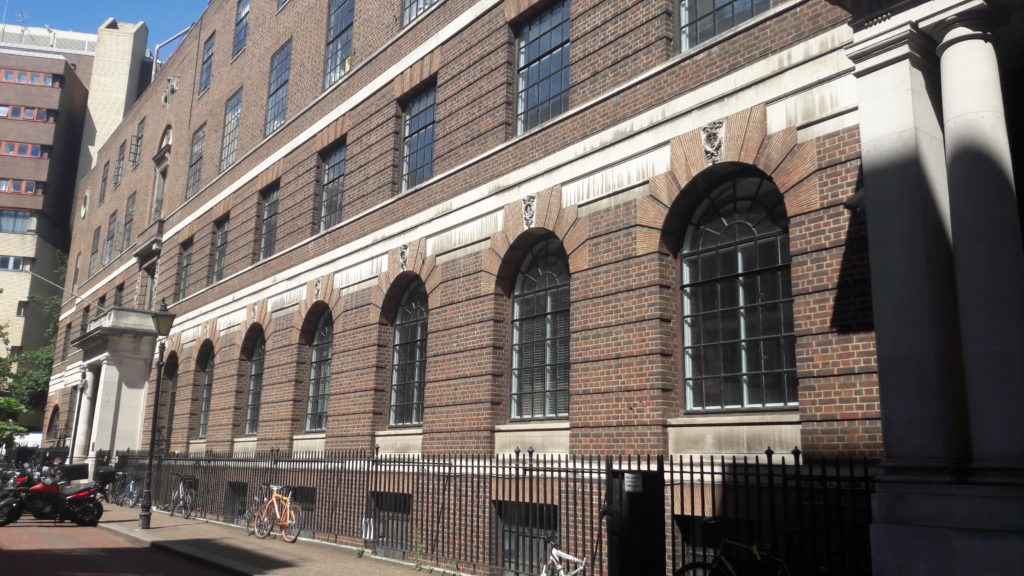
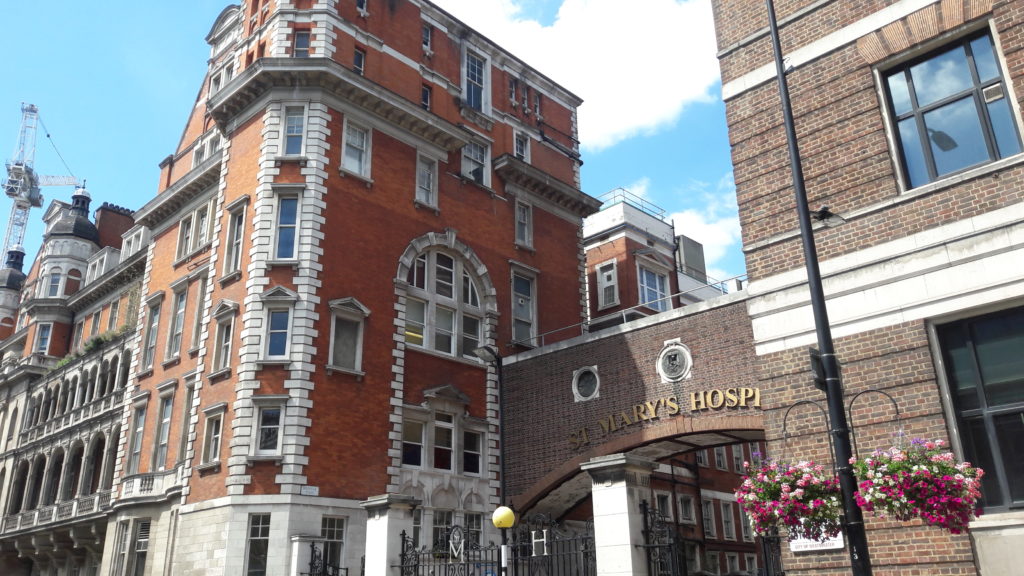
We probably witnessed, without knowing it, the launch of the health propaganda campaign aimed at terrorising the people of Europe. For me, the starting point for this global psychological operation was the strange conference we attended at the Frontline Club on 13 January 2020 – the journalists’ club that was Julian Assange’s place of work and life in 2010 and 2011 and located opposite the Imperial College of London Faculty of Medicine, 13 Norfolk Place. The title of the conference was « Antibiotic Resistance – Refraiming a Global Health Emergency »(9). We attended out of pure curiosity, but in reality we were in the midst of an economic and political environment that would profoundly influence our lives and we didn’t know it. A panel of five ideologues sat in front of an audience of young researchers and journalists. We heard an alarmist speech where the most absurd phrase seemed to be « you are all going to die of an unknown disease ». It made us laugh. It seemed absurd to us that we could terrorize the planet with a speech about antibiotic resistance without talking about human immunity and the adaptation of humanity to its environment. Somehow we were wrong not to take these ideologues seriously, because two months later this guilt ridden and terrifying discourse has become a global norm, the norm in our lives. Are the ideologues who imposed the « coronavirus » policy in our countries the ones who were in the room at the time? At the time, what I was hearing seemed so incredible that I could never have imagined the rest of the scenario.
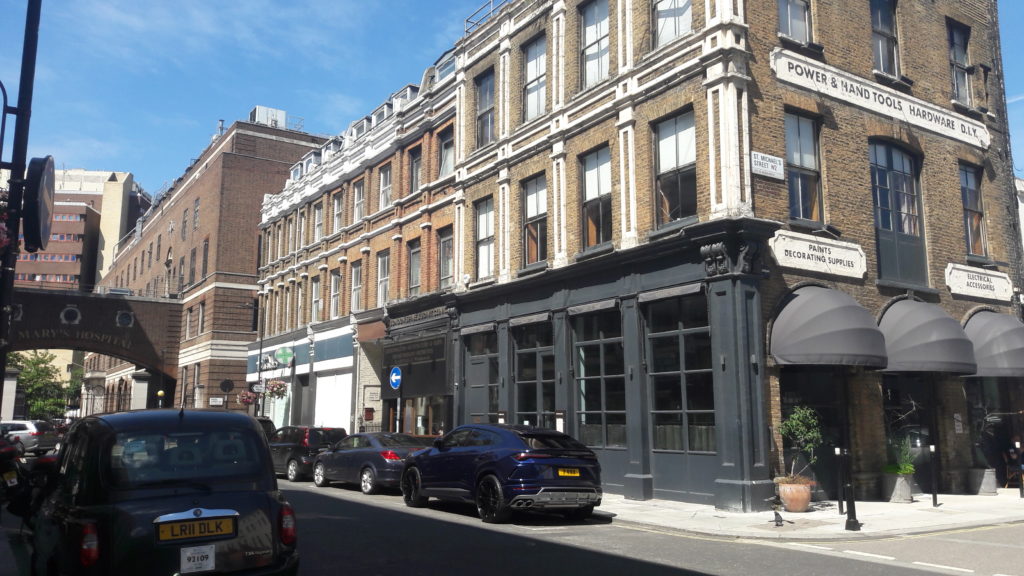
I regret not having been more lucid and not having taken seriously what I was hearing, not having perceived the immediate danger in what seemed to me just a simplistic Soros-style speech led not by serious researchers but by ideologists paid by foundations and private labs. Now, if we want to return to normal life, we need to understand who imposed this discourse in our lives, by what means and for what reason. And undo that power. Yes, our lives are at stake, it’s no exaggeration to say.
1. https://www.imperial.ac.uk/people/neil.ferguson
3. https://ezitis.myzen.co.uk/queencharlottemarylebone.html
4. https://www.maryleboneproject.org.uk/
5. https://en.wikipedia.org/wiki/Imperial_College_London
https://www.imperial.ac.uk/medicine/about-us/
https://www.imperial.ac.uk/stories/covid-19-first-six-months/
https://www.imperial.ac.uk/people/neil.ferguson
7.« It gets tens of millions of dollars in annual funding from the Bill & Melinda Gates Foundation, and works with the UK National Health Service, the US Centres for Disease Prevention and Control (CDC), and is tasked with supplying the World Health Organization with « rapid analysis of urgent infectious disease problems. » – in :
8. https://www.imperial.nhs.uk/about-us/events/predicting-and-preventing-infectious-diseases 9 https://www.frontlineclub.com/superbugs-reframing-a-global-health-emergency/